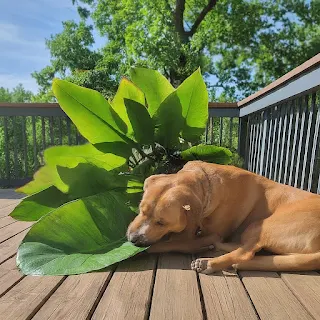Herbs Poisonous to Cats and Dogs
 |
| Herbs toxic to pets |
Household Poison Dangers to Your Cats and Dogs
You may not know it, but using high heat with your non-stick pans can be toxic to your birds, that aspirin and aspirin-like pain relievers can harm your cat, and onions can be toxic to your dog.
Chocolate, Macadamia nuts and raisins can also be harmful to your dog, and cats can have bad reactions to the use of some aromatherapy oils (concentrated essential oils) like lavender.
Just because something is safe for you as a human, doesn't mean it's safe for your pet.
Herbs Toxic or Poisonous to Cats and Dogs
What follows are lists of herbs and spices that are poisonous or toxic (harmful) or poisonous to dogs and cats. This list isn't exhaustive, but it's a good place to start.
 |
| Keep your dog safe From dangerous plants |
*Herbs Toxic to Dogs:
- Aloe
- Bay laurel
- Borage
- Caraway
- Chamomile
- Chives
- Garlic
- Eucalyptus
- Hops
- Lemongrass
- Lovage
- Marijuana
- Marjoram
- Mint
- Mustard Seed
- Oregano
- Paprika
- Pennyroyal
- Purslane
- St. John's Wort
- Tarragon
- Thyme - Spanish
- Yarrow
.jpeg) |
| Chives are toxic to cats |
*Herbs Toxic to Cats:
- Allspice
- Aloe
- Bay Laurel
- Borage
- Caraway
- Chamomile
- Chives
- Cloves
- Eucalyptus
- Garlic
- Lavender
- Lemongrass
- Lovage
- Marjoram
- Mint
- Oregano
- Parsley (Flat-leaf)
- St. John's Wort
- Tarragon
- Thyme - Spanish
- Yarrow
Important Note: These lists are not exhaustive. Consult your veterinarian before changing your pet's diet. Contact your vet immediately if you suspect your pet has ingested a potentially dangerous substance.
For immediate help in an emergency, the ASPCA's Animal Poison Control Center (APCC) is a valuable resource. You can call their pet poison control hotline at 1-888-426-4435. It is open 24 hours a day, 7 days a week -- even on holidays.
Poisons Toxic Substances and Your Pets
It can be difficult to know how a pet will react to a potentially toxic substance. The overall health and age of the dog or cat is an important consideration. How much of a plant is actually consumed and digested plays a roll, too, with cats in particular.
Many dangerous herbs and other plants will cause a burning sensation when chewed, or have an unpleasant taste that will cause a cat to spit it out. This will be uncomfortable, but may not be life threatening because little of the substance has been swallowed. Some cats also like to chew plants and then spontaneously regurgitate them. (There's something debate about the reason for this behavior.) Regurgitation will sometimes reduce the risk of a life threatening exposure to a poisonous plant.
Be aware that even herbs considered generally safe can cause digestive upset when eaten in large quantities or have an adverse effect on already ill or older pets. If you suspect your pet has ingested a toxic herb, contact your veterinarian or animal poison control center immediately.
If your pet is sick, please see a veterinarian. Many vets have flexible payment plans, or there may be community outreach programs that can help you get your pet the care it needs.
*The lists above are not exhaustive. They Include some of the more common herbs. For many less well-known herbs, there is limited information about toxicity specifically to pets. My lists also do not include houseplants or the toxic or poisonous landscape plants your pets may encounter in the garden and elsewhere.
The following link will give you important additional information about houseplants and garden plants that are toxic to pets: Plants That are Toxic to Your Pets
The following link will give you important additional information about houseplants and garden plants that are toxic to pets: Plants That are Toxic to Your Pets
Special note: I receive traffic on this site from people who are looking for alternative methods for treating their pets for illnesses. I don't pretend to be an expert, but I rely on experts when it comes to the health of the animals in my care. You should too.

Comments
Post a Comment
Share some ideas.